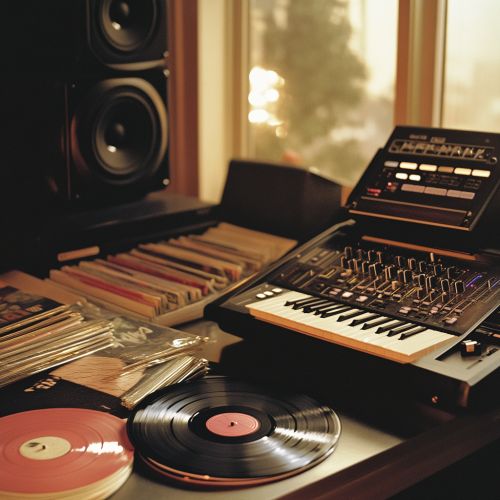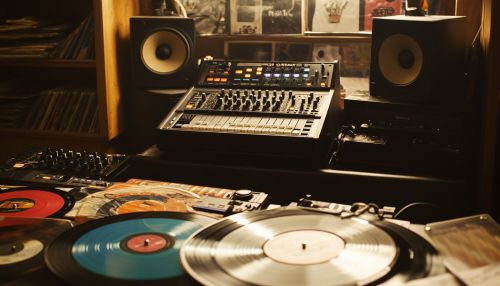J Dilla: Difference between revisions
(Created page with "== Early Life and Background == James Dewitt Yancey, known professionally as J Dilla, was born on February 7, 1974, in Detroit, Michigan. He was raised in a musical family, with his mother, Maureen Yancey, being a former opera singer and his father, Beverly Dewitt Yancey, a jazz bassist. This rich musical environment fostered his early interest in music. J Dilla attended Davis Aerospace Technical High School, where he met future collaborators and honed his skills in...") |
No edit summary |
||
| Line 11: | Line 11: | ||
J Dilla was renowned for his distinctive production style, which often featured off-kilter drum patterns, lush sample layering, and a deep sense of musicality. He was a master of the [[Akai MPC3000]], a drum machine and sampler, which he used to create his signature sound. Dilla's approach to sampling was innovative; he often manipulated samples in unconventional ways, creating new textures and rhythms. His work is characterized by a "swing" that gives his beats a human feel, often described as "drunk" or "sloppy" in a positive sense. | J Dilla was renowned for his distinctive production style, which often featured off-kilter drum patterns, lush sample layering, and a deep sense of musicality. He was a master of the [[Akai MPC3000]], a drum machine and sampler, which he used to create his signature sound. Dilla's approach to sampling was innovative; he often manipulated samples in unconventional ways, creating new textures and rhythms. His work is characterized by a "swing" that gives his beats a human feel, often described as "drunk" or "sloppy" in a positive sense. | ||
[[Image:Detail-98381.jpg|thumb|center|A studio with an Akai MPC3000 drum machine, vinyl records, and a mixing console.|class=only_on_mobile]] | |||
[[Image:Detail-98382.jpg|thumb|center|A studio with an Akai MPC3000 drum machine, vinyl records, and a mixing console.|class=only_on_desktop]] | |||
== Major Collaborations == | == Major Collaborations == | ||
Latest revision as of 10:33, 11 October 2024
Early Life and Background
James Dewitt Yancey, known professionally as J Dilla, was born on February 7, 1974, in Detroit, Michigan. He was raised in a musical family, with his mother, Maureen Yancey, being a former opera singer and his father, Beverly Dewitt Yancey, a jazz bassist. This rich musical environment fostered his early interest in music. J Dilla attended Davis Aerospace Technical High School, where he met future collaborators and honed his skills in music production.
Career Beginnings
J Dilla's career began in the mid-1990s when he formed the group Slum Village with high school friends T3 and Baatin. The group gained local popularity with their unique sound, characterized by intricate beats and soulful samples. J Dilla's production style was heavily influenced by the Golden Age of Hip Hop, which emphasized complex lyricism and innovative production techniques.
Production Style and Techniques
J Dilla was renowned for his distinctive production style, which often featured off-kilter drum patterns, lush sample layering, and a deep sense of musicality. He was a master of the Akai MPC3000, a drum machine and sampler, which he used to create his signature sound. Dilla's approach to sampling was innovative; he often manipulated samples in unconventional ways, creating new textures and rhythms. His work is characterized by a "swing" that gives his beats a human feel, often described as "drunk" or "sloppy" in a positive sense.


Major Collaborations
Throughout his career, J Dilla collaborated with numerous artists across various genres. He worked with notable hip-hop acts such as A Tribe Called Quest, De La Soul, and The Roots. His production on A Tribe Called Quest's album "Beats, Rhymes and Life" marked a significant point in his career, showcasing his ability to blend jazz, soul, and hip-hop seamlessly.
Dilla also collaborated with neo-soul artists like Erykah Badu and D'Angelo, contributing to the development of the neo-soul genre. His work with Badu on the album "Mama's Gun" and with D'Angelo on "Voodoo" exemplifies his versatility and influence across musical styles.
Solo Projects and Legacy
J Dilla's solo career was marked by the release of critically acclaimed albums such as "Welcome 2 Detroit" and "Donuts." "Donuts," released in 2006, is often considered his magnum opus. The album, composed of 31 instrumental tracks, showcases his innovative sampling techniques and emotional depth. It was completed during his hospitalization and released just three days before his death, adding a poignant layer to its legacy.
J Dilla's influence extends beyond his own discography. He is credited with shaping the sound of modern hip-hop and neo-soul, inspiring a generation of producers and artists. His work continues to be celebrated for its creativity, technical skill, and emotional resonance.
Health and Death
In the early 2000s, J Dilla's health began to decline due to a rare blood disease, thrombotic thrombocytopenic purpura, and lupus. Despite his illness, he continued to produce music, demonstrating remarkable dedication to his craft. J Dilla passed away on February 10, 2006, at the age of 32. His death was a significant loss to the music community, but his legacy lives on through his extensive body of work and the countless artists he influenced.
Posthumous Releases and Tributes
Following his death, several posthumous albums and compilations have been released, including "The Shining" and "Jay Stay Paid." These projects have helped to preserve and expand his legacy, introducing his music to new audiences. Numerous artists have paid tribute to J Dilla in their work, reflecting his enduring impact on the music industry.
